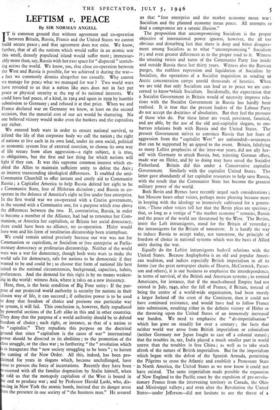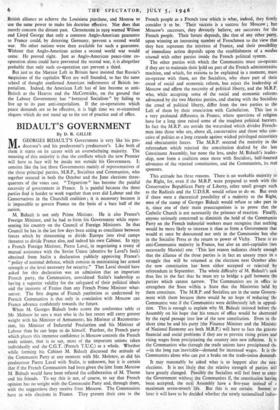LEFTISM v. PEACE
By SIR NORMAN ANGELL
I
IT is common ground that without agreement and co-operation between Britain, Russia, France and the United States we cannot build secure peace ; and that agreement does not exist. We know, further, that of all the nations, which would suffer in an atomic war this small, densely populated island would suffer most ; immeasur- ably more than, say, Russia with herwast space for " dispersal " stretch- ing across the world. We know, too, that close co-operation between the West and Russia is possible, for we achieved it during the war— a fact we commonly dismiss altogether too casually. Why cannot we manage for peace what we managed for war ? Two world wars have revealed to us that a nation like Sours does not in fact put peace or physical security at the top of its national interests. We could have had peace, of a kind, in 1914 and again in 1939 by humble submission to Germany ; and refused it at that price. When we and France declared war on Germany we knew, at least on the second occasion, that the material cost of our act would be shattering. No one believed victory would make even the bankers and the capitalists any richer.
We entered both wars in order to ensure national survival, to defend the life of that corporate body we call the nation ; the right of nations to live each in its own land, under its own social, political or economic system free of external coercion, to choose its own way of life' secure from alien aggression—a right subject, it is true, to obligations, but the first and last thing for which nations will fight if they can. It was this supreme common interest which en- abled the Allies to maintain sufficient unity to defeat the Axis ; an interest transcending ideological differences. It enabled the anti- Communist Churchill to offer instant and costly aid to Communist Russia ; a Capitalist America to help Russia defend her right to be a Communist State, free of Hitlerian dictation ; and Russia to co- operate in the defence of America's right to live under free enterprise. In the first world war we co-operated with a Czarist government, in the second with a Communist one, for a purpose which rose above the differences between the two. If, contrariwise, Russia, in order to become a member of the Alliance, had had to renounce her Com- munism, or America her capitalism, or Britain her social democracy, there could have been no alliance, no co-operation. Hitler would have won and his form of totalitarian dictatorship been triumphant.
We could remain united precisely because our war was not for Communism or capitalism, or Socialism or free enterprise or Parlia- mentary democracy or proletarian dictatorship. Neither of the world wars was a war for democracy, though both were wars to make the world safe for democracy, safe for nations to be democratic if they wanted to be and could be ; to choose that form of national life best suited to the national circumstances, background, capacities, habits, preferences. And the demand for this right is by no means weaken- ing in the world : witness Asia, where it takes on a new insistency.
Here, then, is the basic condition of Big 'Four unity : If the pur- pose of our projected world authority is security for nations in their chosen way of life, it can succeed ; if collective power is to be used to deny that freedom of choice and promote one particular way system, it will fail. This conclusion is, however, flatly repudiated powerful sections of the Left alike in this and in other countries.
hey deny that the purpose of a world authority should be to defend reedom of choice ; such right, or instance, as that of a nation to e "capitalist." They repudiate this purpose on the doctrinal :round that since "capitalism is the cause of war" international
wer should be directed to its abolition ; to the promotion of the
lass struggle, or the class war ; to furthering " the " revolution which s to inaugurate that " new society struggling to be born " ; to hasten he coming of the New Order. All this, indeed, has been pro- laimed for years in slogans which, because unchallenged, have ome to possess the force of incantations. Recently they have been e-asserted with all the familiar dogmatism by Stalin himself, when e told us that the monopoly capitalism of the West is bound in
e end to produce war ; and by Professor Harold Laski, who, dis- ssing in New York the atomic bomb, insisted that its danger arose om the presence in our society of " the business man." He assured us that "free enterprise and the market economy mean war : Socialism and the planned economy mean peace. All attempts to find a compromise are a satanic illusion."
The proposition that uncompromising Socialism is the proper objective of international power ignores, however, the all too obvious and disturbing fact that there is deep and bitter disagree- ment among Socialists as to what " uncompromising " Socialism is ; and even greater differences as to the proper road to it. Witness the amazing twists and turns of the Communist Party line inside and outside Russia these last thirty years. Witness also the Russian purges, the ruthless repression and liquidation of Socialists by Socialists, the operations of a Socialist inquisition in sending to Arctic concentration camps untold thousands of heretics. When we are told that only Socialism can lead us to peace we are con- cerned to know 'which Socialism. Incidentally, the expectation that a Socialist Government in Britain would of necessity improve rela- tions with the Sbcialist Government in Russia has hardly been realised. It is true that the present leaders of the Labour Party do not accept the doctrines of absolutists. But they feel the pressure of those who do. For these latter are vocal, persistent, fanatical, and are able, by the use of the old anti-capitalist slogans, to em- barrass relations both with Russia and the United States. The present Government strives to convince Russia that her fears of aggression from the "capitalist West" are unfounded—assurances that can be supported by an appeal to the event. Britain, falsifying so many Leftist prophecies of the inter-war years, did not ally her- self with Germany to attack Russia, but, rejecting German offers, made war on Hitler, and by so doing may have saved the Socialist Fatherland. Britain did this under a Conservative capitalist Government. Similarly with the capitalist United States. The latter gave abundantly of her capitalist resources to help save Russia, with the result that the Communist State has become the greatest military power of the world.
Both Bevin and Byrnes have recently urged such considerations ; but Moscow hears other voices, perhaps more pleasing because more in keeping with the ideology so intensively cultivated for a genera- tion. &These other voices tell her that the Bevin pleas are specious ; that, so long as a vestige of " the market economy " remains, Russia and the peace of the world are threatened by the West. The Bevins, insist the Left intransigents, stand for the Britain of yesterday ; the intransigents for the Britain of tomorrow. It is hardly the way to induce Russia to accept today, not tomorrow, the principle of freedom of choice in national systems which was the basis of Allied unity during the war.
Equally do the Leftist intransigents bedevil relations with the United States. Because Anglophobia is an old and popular Ameri- can tradition, and indicts especially British imperialism in all its forms (see the great newspaper chains of Hearst, McCormick, Patter- son and others), it is our business to emphasise the interdependence, in terms of survival, of the British and American systems ; to remind Americans, for instance, that if the much-abused Empire had not existed in July, 1940, after the fall of France, if Britain, instead of being the centre of a world-wide organisation, had been merely a larger Ireland off the coast of the Continent, then it could not have continued resistance, and would have had to follow France into submission, resulting either in the definite victory of Hitler of the throwing upon the United States of an immensely increased war burden. We need to emphasise the " de-imperialisation " which has gone on steadily for over a century ; the facts that neither world war arose from British imperialism or colonialism (neither Germany nor Japan fought to cast off a colonial status) ; that the troubles in, say, India played a much smaller part in world unrest than the troubles in free China ; as well as to take stock afresh of the nature of British imperialism. But for the imperialism which began with the defeat of the Spanish Armada, permitting the Pilgrims to cross the Atlantic and establish a Protestant State in North America, the United States as we now know it could not have existed. The same imperialist made possible the expansion of New England to the Pacific coast by the expulsion of pre-revolu- tionary France from the intervening territory in Canada, the Ohio and Mississippi valleys ; and even after the Revolution the United States—under Jefferson—did not hesitate to use the threat of a British alliance to achieve the Louisiana purchase, and Monroe to use -the same power to make his doctrine effective. Nor does that merely concern the distant past. Ckmenceau in 1919 warned Wilson and Lloyd George that only a common Anglo-American guarantee to France could, by deterring Germany, prevent a second world war. No other nations were then available for such a guarantee. Without that Anglo-American action a second world war would come. He proved right. Just as Anglo-American peace-time co- operation alone could have prevented the second war, it is altogether probable that only such co-operation can-prevent a third..
But just as the Marxist Left in Britain have insisted that Russia's Suspicions of the capitalist West are well founded, so has the same school of thought confirmed American indictments of British im- perialism. Indeed, the American Left has of late become as anti- British as the Hearsts and the McCormicks, on the ground that the Labour Government has " betrayed Socialism " by failing to live up to its past anti-imperialism. If the co-operations which peace demands are to be effective, it is high time we re-eiramined slogans which do not stand up to the test of practice and of office.



























 Previous page
Previous page